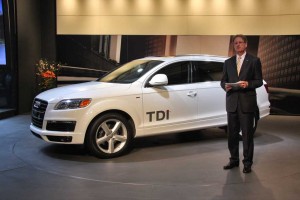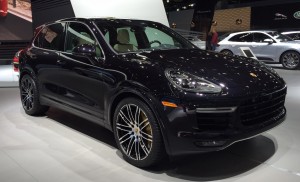
A VW Touareg with the 3.0-liter TDI is part of the automaker's diesel scandal and has been approved to be repaired.
Volkswagen has been given the go ahead to repair about 38,000 VW, Audi and Porsche SUVs equipped with 3.0-liter turbodiesels the German maker had originally rigged to illegally pass U.S. emissions tests.
Earlier this year, U.S. and California regulators approved similar repairs for about 326,000 VW and Audi products using a 2.0-liter diesel engine that had also been altered. All told, VW has admitted using “defeat device” software on nearly 500,000 diesel vehicles sold in the U.S., and more than 11 million cars and trucks sold worldwide.
It has since agreed to about $30 billion in fines and penalties, though the approval of a fix for the larger engine could save the German carmaker as much as $1 billion, according to a letter released by the U.S. Environmental Protection Agency today.
The scandal erupted in September 2015 when the EPA accused of rigging 2.0-liter diesel models, such as the Golf TDI, so that they would reduce output of pollutants such as smog-causing oxides of nitrogen during emissions tests.
(VW doubles warranty hoping to put diesel scandal in review mirror. Click Here for the story.)
In real-world conditions, however, they could produce nearly 40 times more of those gases. Subsequently, the automaker confirmed it had also rigged models using the 3.0-liter engine, as well.
In a series of settlements with federal and state regulators, VW agreed to pay a series of fines and to buy back vehicles that it could not bring in compliance with both U.S. emissions standards and California’s tougher emissions mandates.
Last spring, a fix for the smaller engine was approved, though it could not be applied to some older models. All told, as many as 326,000 of those vehicles, about 75% of the ones using the rigged 2.0-liter turbodiesel, qualified – though some may ultimately be repurchased by the automaker anyway.
The 3.0-liter fix is similar in nature and scope. But it covers less than half of the 80,000 vehicles sold in the U.S. using the larger engine. Depending upon the model and when it was sold, the repairs will vary. Some newer vehicles will only need software upgrades. Older models that can be repaired will need some hardware upgrades, as well as revised engine control software.
(Click Here for details about VW’s 10-year U.S. comeback.)
Even with the fix, owners who keep their vehicles will be eligible for payments of anywhere from $8,500 to $17,000.
Three models are covered by the plan: the Volkswagen Touareg, the Audi Q7 and the Porsche Cayenne. All three SUVs are based on the same platform. The Audi ute was sold in the U.S. during the 2013 to 2015 model-years, the other vehicles were also sold in 2016.
VW last month accounted for the planned engine repairs, adding about $3 billion to the cost to date of the diesel scandal. Including private settlements with dealers and others, the cost has now mushroomed to about $30 billion. Internal company documents showed that when Volkswagen’s top management first learned of the subterfuge they expected it would cost the company under $1 billion.
The settlements and fines don’t reveal the full impact, however. VW also took some hard hits in the new vehicle market after the scam was revealed. At their peak, the carmaker’s diesels accounted for 20% of its U.S. sales and demand tumbled by double digits. Sales have begun picking up this year, but they’ve been buoyed by both hefty incentives and the launch of new models like the big Atlas SUV.
(VW updates Atlas for weekend warriors. Click Here for more.)
The VW brand no longer plans to sell diesels in the States, though Audi expects to continue offering one or two models. Globally, the Volkswagen Group, which includes a dozen different automotive brands, is phasing back on diesels and shifting focus to electrified products such as the Golf EV and a new sub-brand dubbed I.D. All told, VW expects to offer at least 23 all-electric models by 2025, along with an assortment of new hybrids and plug-ins.


